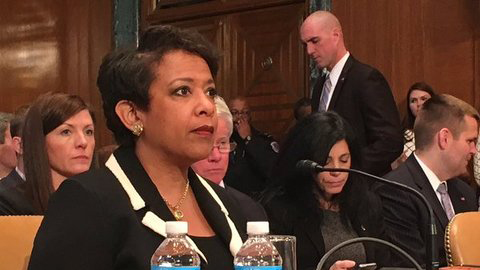
Attorney General Loretta Lynch speaks at hearing on executive gun actions.
WASHINGTON — U.S. Attorney General Loretta Lynch said Wednesday new executive actions on firearms issued by President Barack Obama are constitutional since they only aim to better enforce gun laws and background checks already on the books.
The main elements of the president’s orders, such as more stringent enforcement of reporting requirements to the National Instant Criminal Background Check System, are meant to clarify and strengthen existing laws, Lynch said.
“By enhancing our national system of background checks, we will be better prepared to keep guns out of the wrong hands in the first place,” she told a Senate Appropriations subcommittee.
However, Republican Sens. James Lankford of Oklahoma, and Richard Shelby of Alabama, questioned the effectiveness of the background check system. Of the states that do report felony information to NICS, only federal felonies are being submitted immediately with many state crimes going unreported, Lankford said citing data compiled by the FBI.
In an effort to address this issue, Lynch said she has sent letters to every governor stating the importance of the national background check system and offering assistance in creating more efficient state reporting systems. According to the Bureau of Justice Statistics, more than $22 million in federal grants were awarded last year to 25 states to support improvements in reporting systems.
Despite this, Alabama Attorney General Luther Strange testified that Alabama has only begun receiving money at the state level in the past year to develop its tech systems. Alabama has received nearly $2 million in grants since 2009.
“Without the resources…we have a system that is functionally broken,” Strange told the commerce, justice and science subcommittee.
Though Shelby said the subcommittee has “balked” at suggested cuts to NICS and state grants in recent budgets proposed by Obama, he said strengthening the background check system would not prevent mass shooting tragedies like the one at the Sandy Hook elementary school in Newtown, Conn., where guns purchased legally were used.
The Justice Department has issued guidance that outlines who, based upon existing law, is required to be licensed as a firearms dealer. Lynch said the Justice Department and the Alcohol, Tobacco and Firearms bureau continuously receive requests from individuals confused as to whether they need to get a dealer’s license. She said the guidance documents will help clarify the existing laws — not redefine them.
Firearms dealer licenses are required for those who repeatedly sell and profit from the sale of guns, Lynch said. Gun hobbyists and collectors are among those who do not need licenses.
“The definition has not changed because the statute has not changed,” she said. “It is not so much where someone operates, but what one does that indicates whether someone is a dealer.”
The Justice Department will also request funding in the fiscal year 2017 budget for the necessary technology and manpower to process background checks. However, Lynch said a request for 200 more ATF agents in the budget would not increase the size of the agency, but rather fill existing spots as a large number of agents are eligible to retire.
Sen. Barbara Mikulski, D-Md., pressed the importance of changing the status quo of gun violence, saying that improved background checks are needed for that change to happen.
“We must all pull together because we are all in this together,” Mikulski said. “We all have shootings, that’s what is so terrible. We all have shootings.”

